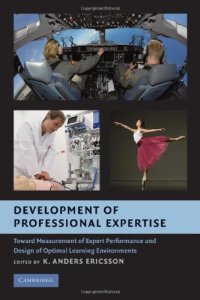
Ebook: Development of Professional Expertise: Toward Measurement of Expert Performance and Design of Optimal Learning Environments
Author: K. Anders Ericsson
- Genre: Education
- Year: 2009
- Publisher: Cambridge University Press
- Edition: 1
- Language: English
- pdf
Development of Professional Expertise is perhaps the finest book I've ever read on how to generate great individual and group performances, and I've read more than 400 books on the topic. Indirectly it shows how ineffective traditional talent management really is at many organizations. Using terms like "work-sample testing, engagement simulation, and after-activity reviews," it provides the reader with a toolbox of approaches that can be applied in any type of organization. The variety of authors and case studies provides extraordinary breadth and depth on the topics of objectively measuring performance and ways to improve it. I can't think of a better investment for any business manager who wants to improve performance throughout his or her organization, or part of an organization.
My favorite parts of this book were the actual methods for improving performance, which include engagement simulation, cognitive apprenticeship, processing activities, modeling, and problem-based methods. My on-going professional quest is to find ways to improve group performance because I believe groups are the fundamental unit of any organization. No individual creates and delivers value to customers in a vacuum. That value is created and delivered by groups of people. Organizations don't create new products or services. It is groups within those organizations that create the new products and services. Consequently any methods that can be applied to improve group performance are very valuable in my opinion.
Even though on page three, it says, "The primary focus of this book is on individual performance," I still believe these methods for improving performance can be applied to groups as well even though it may require some tweaking of the methods.
An additional strength of the book is the breadth of examples and authors. This theme of developing professional expertise was looked at from the eyes of more than 30 authors, all of whom seem to know the content of their chapters very well. This enriched the overall perspective that the reader gained from the book. It would be impossible for any one person to have that much breadth of knowledge and experience.
My favorite parts of this book were the actual methods for improving performance, which include engagement simulation, cognitive apprenticeship, processing activities, modeling, and problem-based methods. My on-going professional quest is to find ways to improve group performance because I believe groups are the fundamental unit of any organization. No individual creates and delivers value to customers in a vacuum. That value is created and delivered by groups of people. Organizations don't create new products or services. It is groups within those organizations that create the new products and services. Consequently any methods that can be applied to improve group performance are very valuable in my opinion.
Even though on page three, it says, "The primary focus of this book is on individual performance," I still believe these methods for improving performance can be applied to groups as well even though it may require some tweaking of the methods.
An additional strength of the book is the breadth of examples and authors. This theme of developing professional expertise was looked at from the eyes of more than 30 authors, all of whom seem to know the content of their chapters very well. This enriched the overall perspective that the reader gained from the book. It would be impossible for any one person to have that much breadth of knowledge and experience.
Download the book Development of Professional Expertise: Toward Measurement of Expert Performance and Design of Optimal Learning Environments for free or read online
Continue reading on any device:

Last viewed books
Related books
{related-news}
Comments (0)